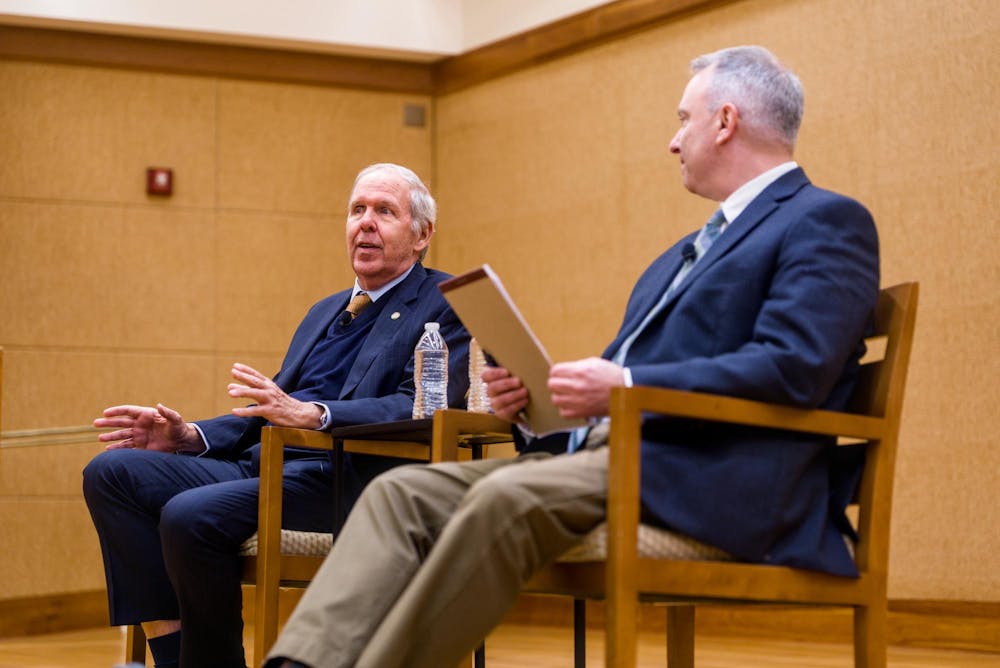Panamanian Ambassador to the U.S. José Miguel Alemán Healy spoke Monday, discussing the Panama-U.S. relationship. The event started with Ambassador Alemán speaking a bit about his home country and then transitioned into a conversation with David Leblang, director of policy studies at the Miller Center.
The Center for Politics hosted the event as part of Global Week 2025 — a collection of events spanning Nov. 8 to Nov. 16 to celebrate International Education Week — in collaboration with the U.S. Department of State and the U.S. Department of Education in an effort to create opportunities for knowledge exchange, benefitting Grounds and the world at large.
Ambassador Alemán said that there are numerous connections between Virginia and Panama, including their own gateways to global markets — Norfolk and the Panama Canal. Both also have major ties to American national security, Alemán said. Virginia is home to Quantico and the Pentagon, while Panama has hosted U.S. regional conferences for the U.S. The last connection he made was between Northern Virginia and Panama being global centers of technology and logistics, with Northern Virginia supporting data centers and Panama supporting semiconductor manufacturing and supply chain resilience.
“The story of Panama and Virginia is much more than a diplomatic relationship. It is a history of human connection, a story of ideas that travel, of people who build bridges,” Alemán said. “[The] values we hold in common [are] … shared belief in democracy, dignity, mutual respect, and the idea that societies grow stronger when they choose cooperation over distance.”
Ambassador Alemán said his family has had a relationship with the U.S. since the 1960s. Both his father and brother served as Panamanian Ambassadors to the U.S. Alemán also has a personal relationship with the college — his son graduated from the University in 2013.
“[Panama is] a strategic ally for the United States. In very simple terms, Panama is a small country, but we offer one of the most stable and trustworthy economic platforms in the hemisphere,” Ambassador Alemán said.
Third-year Engineering student Isaiah Henley thought the event was a unique opportunity to speak with someone who had political power in Panama.
“Being an Afro-Panamanian and me being in the Engineering school, I thought this was a unique opportunity to come speak to somebody that had some type of political autonomy within the Panamanian government, even if it's not [the] president. I just thought it was a great opportunity to come speak to the ambassador,” Henley said.
Transitioning to the national stage, Ambassador Alemán said he believes that Panama and the U.S. have a great trade relationship. Panama does not have a currency of its own and instead relies mainly on the U.S. dollar for transactions. According to Alemán, the U.S. is also Panama’s main commercial partner.
The Trump administration placed a 10 percent tariff on the country recently, but U.S. Ambassador Alemán said that putting tariffs on the U.S. would do more harm to Panama than the U.S. Currently, Panama has no tariffs on most American-made goods with the exception of some agricultural goods.
Alemán addressed that over the past few months, the U.S. military has struck alleged Venezuelan drug smuggling ships and, in August, doubled the bounty on Venezuelan President Nicolás Maduro to $50 million. Ambassador Alemán said that he sees this as an issue between the U.S. and Venezuela and not something that concerns Panama. He said he hopes to see the issue resolved diplomatically, but noted that Panama always stands for democracy and does not agree with governments that do not have free and fair elections.
“We always support democracy, and we always support human rights, and we do not agree with governments or regimes that do not recognize the will of the people in elections … do not recognize freedom of speech,” Ambassador Alemán said.
Continuing to speak on Panama’s international presence, Leblang said that Panamanian ports under Chinese ownership have been a major issue of the Trump administration because they are a way for China to exert influence over trade. U.S. Secretary of State Marco Rubio made Panama one of his first official visits in February to discuss the Chinese influence over the canal. The ambassador said that it was never the country’s intention to give power to China.
Ambassador Alemán said that he sees two ways for the ownership of the ports to be transferred to American firms. Currently, there are negotiations between the companies that could result in a deal. The second way would be for Panama to claim that the Chinese firms have not held up their end of the contract, and as such, the contract would be null and void, and ownership would return to Panama.
Among the guests at the event were students from the Miller School of Albemarle. Jenette Reyes, a teacher at the Miller School, brought students who will be traveling to Panama and Costa Rica during Spring Break to the event. Reyes saw this as an opportunity to help students learn more about Panama before they visit.
“[We have] a holistic approach, with our minds, hands, hearts, [it’s] our motto … We heard the ambassador of Panama was coming, and I knew it was going to be an amazing opportunity to connect a little bit of academics and culture to the trip,” Reyes said.
Cullen Bigoness, a ninth grader at the Miller School, was fascinated by all that he learned about Panama, and he looks forward to seeing everything the ambassador described when he visits Panama.
“It was really incredible seeing how much vibrancy there is to a country like Panama, and how much history is intertwined with our country as well. Just seeing how much, how vast everything, all the knowledge is around our two countries together,” Bigoness said.







